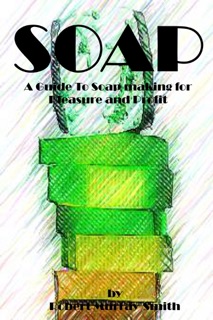Soap making is really easy and there are basically only two ingredients:
Lard
Lye
If that seems a bit complicated there is an even easy method. One tremendous secret of soap making is that soap melts! This might not seem earth shattering. But, as it melts you can use simple cheap soaps as a base for your own creations.
There are certain cautions that you do need to take, however, thousands of people around the world make homemade soap every day of the year safely and without getting hurt in any way. What it takes is a good dose of common sense are the realization that you are working with chemicals, especially lye, that is volatile if not handled correctly. However, once you have this knowledge and know what to look out for making soap becomes a great hobby, and maybe even more, and once bitten you will probably never buy another bar of soap again.
Commercially produced soaps are usually made with tallow (beef fat), lard (pork fat), and a lot of inexpensive coconut oil to fill up the bulk of the recipe. Along with that they add dye, fragrance, surfactants, sudsing agents, water softeners, and detergents.
A lot of people find that these additives irritate the skin, leave a scum in the water, smell awful or are just plain terrible to use. Worse, the manufacturers salt out the naturally occuring glycerin to sell elsewhere. The glycerin is what would have made the soap mositurising. To replace the glycerin, they then add mineral oil and then call it a Beauty Bar which coats your skin with a non absorbable grease. Mass produced soaps leave a lot to be desired. The quite simple answer to this is to make your own.
Most of the soaps readily available on the market will not compare to your own creation on so many levels. Once you've used soap you made by hand with contemporary techniques, there is no going back to shop bought. There is enormous satisfaction in saying, "I made this." And perhaps that is the main reason to make your own soap. With all the extras you can add - such as extra cream to create softer and smoother skin, or extra olive oil to nourish and moisturize your skin as you shower. Any fragrance you desire in soap could be yours when you create your own. No more hunting for soaps with your special fragrance. You can now create your own at a fraction of the cost. Love the smell of lavender, jasmine, sandalwood, or even vanilla in your bath, then add these essential oils or fragrance oils. Or you can omit the fragrance all together and still have a superior bar of soap.
Another reason why people make soap is a desire to create beautiful, useful things. Motivation can range from wanting to capture the essence of a favourite flower to wanting to have a perfect color match for a newly painted bathroom. The beauty of herbs and flowers, the harmony of well-orchestrated colour, and the tactile satisfaction of varied textures are all artistic elements that can be incorporated into a simple bar of soap.
Along with being beautiful, handmade soap is also, of course, useful. What could be more useful than a bar of soap? No matter how fancy and fabulous you make it, it still does one basic, essential thing: It cleans. Soap not only cleans skin, but you can make soap to clean hair, clothes, dishes, pets, carpets, and more. Almost anything that can be washed can be washed with handmade soap.
Soap making is one of those crafts that once you have the bug you will be churning the stuff out by the ton.
Basically there are three main methods for soap making at home
Use a pre-made soap base
Make soap from readily available materials
Make soap from scratch.
I have split this little book into three sections. Part 1 covers pre-made soap bases, part 2 is about making soap from readily available lyes and fats and part three is how to go about rendering your own fat and making lye from wood ash. Hopefully this will help you on your journey and encourage you in your craft.










